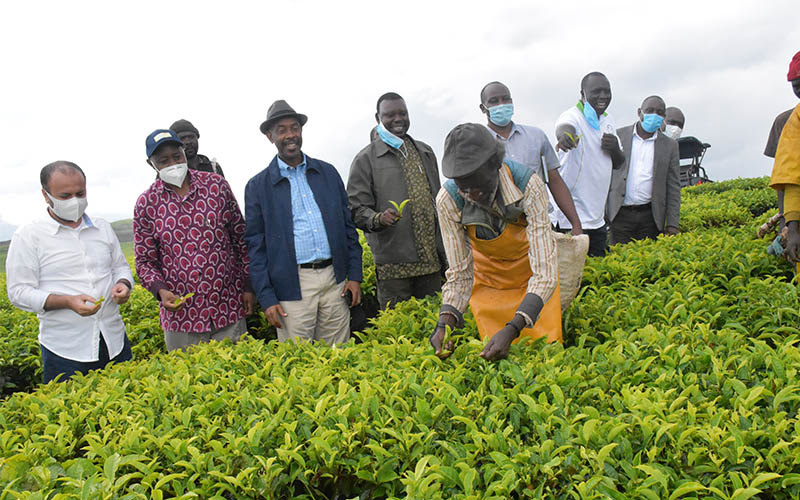KAMPALA, UGANDA: Government of Uganda has developed a policy to regulate the tea industry and to address challenges affecting the tea sub-sector in the country.
The ministries of agriculture and their trade counterparts developed the National Tea Policy to guide tea production, processing and to support the diversification of tea products produced.
The policy that awaits to be submitted to the Cabinet focuses on improving access to quality agro–inputs including tea seedlings, fertilizers and herbicides, enhancing the use of modern technologies informed by research and extension services.
It also seeks to institute measures to improve harvesting, post-harvest handling and value addition, strengthening the infrastructure for the tea industry including establishing factories and other requisite machinery, improving access to affordable power supply, financial and insurance services, enhancing market access, advocacy, education, information and communication services among others.
Government officials say that the the tea industry has a higher potential to contribute more to the national economy, employment creation, and environmental conservation.
Once approved, the tea policy will be developed as a commercial enterprise and an instrument to fight poverty through gainful agricultural employment where more investments shall be made at the lower stages of the value chain and majority of the tea stakeholders are engaged to ensure they are employed gainfully in ways that elevate household incomes and alleviate poverty.
The policy seeks to promote improved tea research and extension service delivery, establishment of tea farmer associations and credit cooperatives, expansion of the area under tea and gap filling in existing tea plantations as well as increase tea processing capacity and value addition.
State Minister for Agriculture Fred Bwino Kyakulaga said that the policy seeks to promote issues of quality because the market demands are enormous.
“The consumers are demanding a lot of quality innovations, so we hope that by formulating this policy, we shall be able to address that gap and achieve the consumer demands,” Kyakulaga said during a validation meeting of the policy in Kampala organised by development partner organisations including Trust Africa and Solidaridad East and Central Africa together with the Ministry of Agriculture.
About the fertilizers, Kyakulaga allayed fears of the farmers saying that the president has since recognized the demand by various farmers for subsidy and hence it will be considered.
Dr. Bethule Nyamambi, the Programme Manager at TrustAfrica also representing Solidaridad East and Central Africa described the validation of the draft National Tea Policy as a milestone in the tea sector.
She said that through their ‘Reclaim Sustainability programme’, the organisations are working with all those in the tea sector to foster inclusive and sustainable value chains and trade in an innovative way.
Dr. Bethule said that the arrangement seeks to encourage an enabling policy environment in which the interests, voices and rights of all stakeholders including those of farmers, women, workers and citizens are represented and heard in decision making.
“The policy that has meaningfully consulted all the players in the sector will have meaningful sector changing impact, have ownership, and the sector will able rights and interests of producers and workers and citizens impact and gain results in improving decent working conditions, sustainable natural resource management, achieving fair value for all in the value chains,” she explained.
Onesmus Matsiko, the chairperson of Uganda Tea Outgrowers Association (UTOA) said the tea policy came out of a regulatory vacuum.
He explained that following the liberation of the economy, the old laws of tea became obsolete but the tea industry acreage has grown from about 20,000 hectares in the year 2001 to currently over 45,000 hectares of tea with massive production where tea farmers dominating tea production and small holder farmers own more than 70 percent of Uganda’s tea acreage.
“Farmers grow tea and sell to factories which they do not own and the environment of tea growing and purchase is not regulated hence we have lost the fertilizer supply mechanism where tea farmers do not access fertilisers and the acreage talked about is yielding less than half of the potential,” said Matsiko.
According to Matsiko, the tea industry have lost quality control capacity where Uganda tea quality is suffering and that on the international scene, Ugandan tea sells the least amount of about $1 compared to our Kenya counterparts who sold at an average of $2.2 and Rwanda sold at $2.4 per Kilogramme as of last week
“Uganda’s tea is selling at less than half of our neighbouring countries because our quality control has crashed, there is no regulation, our national acreage is giving half of its potential. Even without giving anymore seedlings, we can at minimum double Uganda’s tea production but all this needs the facilitation, coordination, guidance of the national team policy,” he added
Matsiko also the General manager of Mabale Growers Tea Factory in Kabarole District said that he was part of the policy draft team said that the policy covers the agriculture, tea processing and the tea trade components.
Currently, tea is the third agricultural export earner in the country, earning over $85 million according to the BOU figures for 2022.
In the economy, tea contributes about 1.6 percent of Uganda’s Gross Domestic Product and provides 11 percent of the national employment.
Although the tea sector greatly contributes to exports and the national economy, it is faced with low production, low quality of tea and limited competitiveness of the tea products in the regional and international market
If you would like your article/opinion to be published on Uganda’s most authoritative news platform, send your submission on: [email protected]. You can also follow DailyExpress on WhatsApp and on Twitter (X) for realtime updates.



